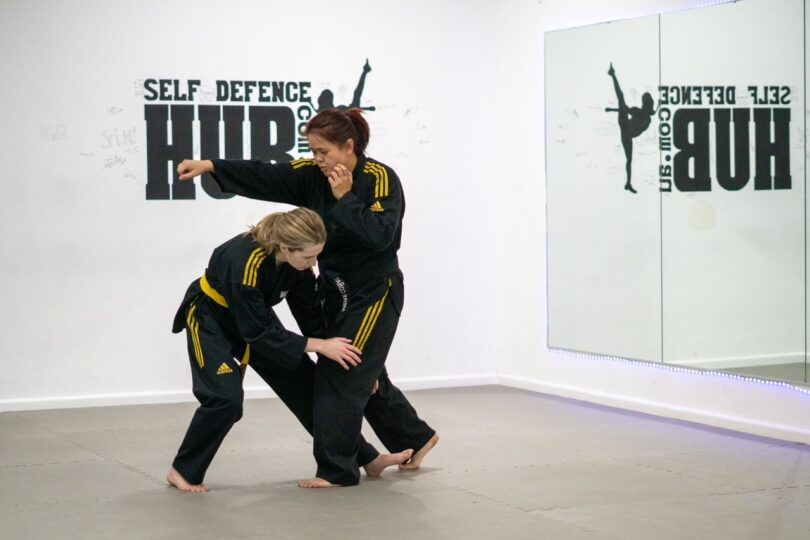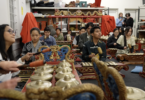On a padded floor in a room with a mirror-lined wall, half-a-dozen young women in black martial arts robes are paired up and taking it in turns trying to break free of a headlock.
Self-Defence Hub is a place run by women for women, with the aim of teaching women and girls self-defence skills that will give them a sense of empowerment and safety.
Across Australia 20 women have been killed in 22 weeks. Ninety-three percent of family and sexual violence services have seen an increase in demand for their services since the Covid-19 pandemic began.
The National Women’s Safety Alliance says that “we are living through a national crisis in domestic, family and sexual violence”.
Andre Conate, the instructor and founder of Self-Defence Hub, is all too aware that for many women, the fear of violence is an issue of domestic violence—and it has informed her teaching.
Andre has adopted the custom across a variety of martial arts of having her students wear different coloured belts—but she has adapted their meaning. “A white belt means you are learning how to get yourself out of a situation,” she explains. “A yellow belt means you are learning how to take control of a situation.”
Andre explains, that she teaches women what to do in circumstances where they might not be able to run. For example, because they have a child in the home with them who they cannot leave behind.
It is this level of thoughtfulness and detail that has directly led Jane* to Andre’s classes. A victim of rape, Jane learned about Self-Defence Hub through the Victims of Crimes Assistance Tribunal (VOCAT).
Jane explains how, for a long period of time, she remained frightened anytime anyone would touch or come near her. When she discovered the classes and the way Andre has tailored them to address the real life situations many women find themselves in, “it felt like the kind of thing I could do”.
“Someone’s thought about this,” says Jane, “and made somewhere where people can feel safe and gain confidence and a sense of empowerment.”
For others, there was no specific trigger point, rather an ongoing discomfort in everyday public spaces—often experiences on public transport—which made them take action.
“I lost so much confidence going on public transport,” explains Lauren, who started catching trains when she was in high school. “It wasn’t anything extreme, but men approaching me when I wasn’t with my friends, coming too close—it was enough.”
It was a similar sense of constant vigilance and discomfort for 24 year old Emma, who’s apprehension spiked after 21 year old exchange student Aiia Maasarwe was killed in a random attack in Bundoora in 2019.
“I didn’t want to be in a situation where I didn’t know what to do,” explains Emma, who has been attending Andre’s classes for seven months.
After her students have each broken free of a head lock, Andre lies on her back with a student standing above her as if she has pinned Andre to the floor. Andre then asks her students what move they think she is about to perform.
“Eggbeater,” one white belt student answers with a little bit of a grin on her face. The student is correct. Andre goes on to demonstrate the move that involves landing quick, sharp kicks between the legs of someone who is standing over you.
*Name changed at interviewee’s request
If you or someone you know are experiencing sexual abuse or family violence, contact:
- SHE (free and confidential counselling and support) on 6278 9090
- Sexual Assault Support Services on 6231 1811, or after hours 6231 1817
- Full Stop Australia on 1800 385 578
Featured image: Andre Conate






